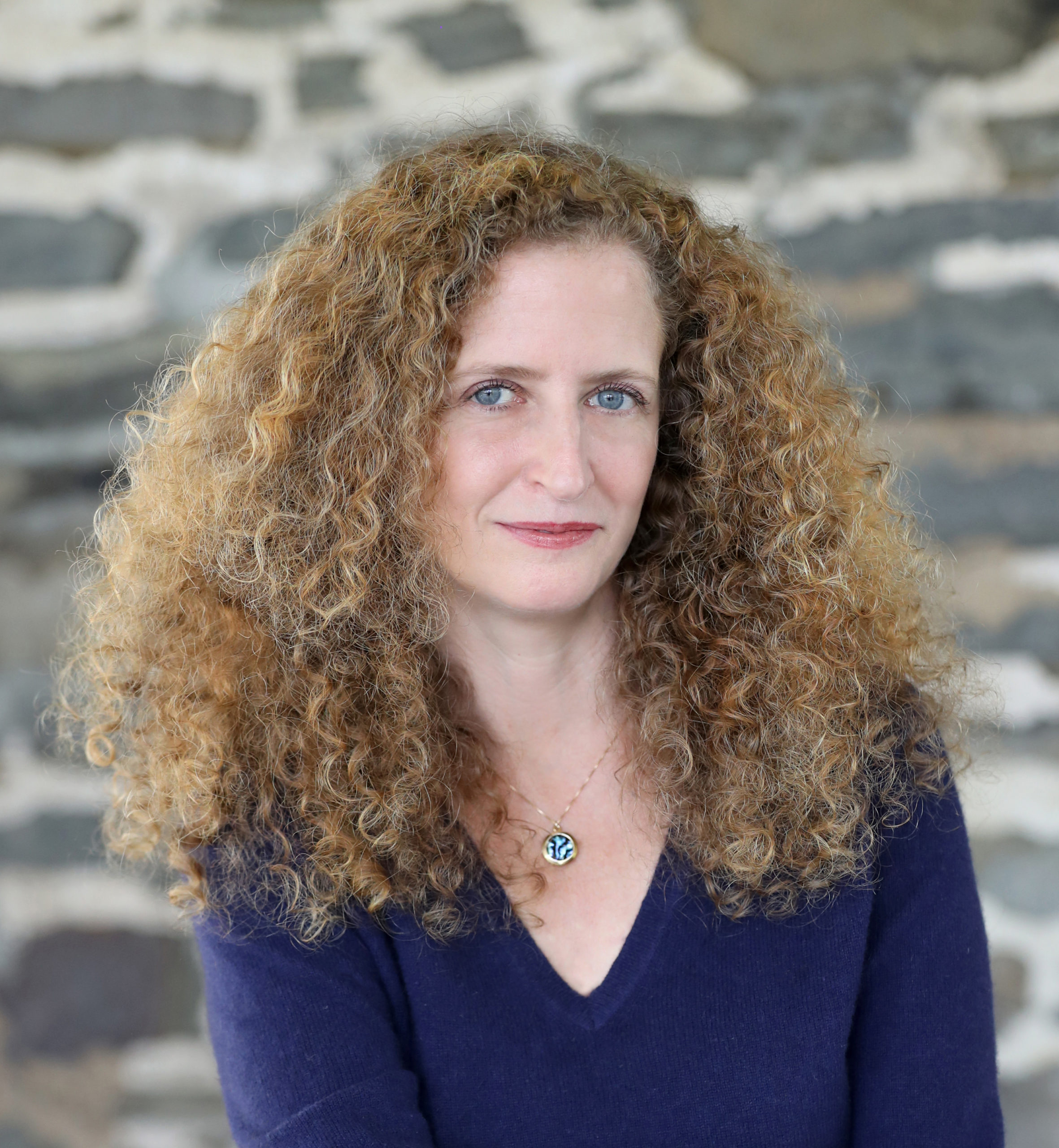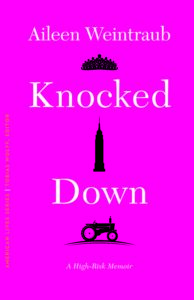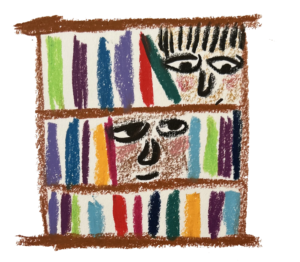
“Life is the Curveball:” Aileen Weintraub on Her Bedrest Memoir
Aileen Weintraub’s upcoming book, Knocked Down: A High Risk Memoir, plumbs the depths of a dark time in her life. In it, she explores the many months she spent trapped in her bed for the wellbeing of her unborn child. True to form, the memoir will make readers, at turns, both laugh out loud and worry deeply.
I recently had the chance to speak with the award-winning author, who has written a dozen children’s books, about Knocked Down, growing up Jewish in Brooklyn, and everything in between.
When did you realize that you wanted to write about your experience of being on bed rest?
When I first had the idea for this book, ten years ago, my son was five years old. Bed rest had really upended my career, and raising a child, dealing with postpartum depression and anxiety, and just trying to keep it all together really made it hard to get back into writing. When my son was finally in kindergarten, I knew it was time to start focusing on my career again. I wanted to start remembering who I was outside of being a parent.
I got this amazing group of women together for a book club, and we chose The Happiness Project by Gretchen Rubin. Soon after, Knocked Down became my happiness project. I started writing, just thinking I would put it all down. I had this story to tell, and I needed to give it light and let it breathe so that I could process the trauma. I ended up writing it in between class lunches, meetings, and making cookies. I wrote it in my car in the parking lot, in the library, in the tub on my phone—just at any moment I could. I put it away so many times, but I kept coming back because I knew it was important.
Once I had the draft, I didn’t know what to do with it, so I hid it in a plastic bag in the back of my closet. I felt like, here, I’d done it. But then my friend Erica Chase Salerno invited me to be a part of a writing group she was forming. I admired her so much. I get teary talking about her—has since passed away from breast cancer—because she changed my life by having more faith in my writing than I do. We spent two years in this writing group, reading chapters for each other, and really digging in. I started bringing these chapters, getting raw and vulnerable, and actually telling the story that was underneath that first draft. That’s how I really came to invest in this book.
Knocked Down is a departure from your other books, which have mostly been written for young adults or children. Can you share about the shift to writing for an adult audience?

I love being a children’s book author, and I have a new children’s book that just came out, too, called We Got Game: 35 Female Athletes Who Changed the World, all about empowerment and advocacy. To me, it wasn’t such a leap because I feel like there’s a connection between those two books and the idea of fighting through challenges and getting your voice out there and heard, as I wrote about in Knocked Down. It’s definitely a different part of your brain, though. You’re telling the same story but using different language for the two audiences.
Your memoir weaves together numerous threads: Grief, high-risk pregnancy, interfaith relationships, and prenatal depression, to name a few. Why did you choose to structure it that way?
It felt natural to intertwine them, because that’s life. Life doesn’t happen one thing at a time, where you’re just grieving someone, and then you’re on bedrest, and then you have difficulties in your marriage. These things all happen, and often at the same time. I was recently talking with a friend of mine, and we came to the conclusion that life doesn’t throw curveballs at you. Life is the curveball. We’re always processing something.
It’s very hard to just say, “I am perfectly happy and nothing is wrong.” I mean, it’s wonderful when it happens. But life is full of grief, and difficulties and struggle, and I think it’s just real that all of these things are happening all at once. There’s a line later in the book, where my brother says my life is like every after school special rolled into one. And it’s true! Our house is collapsing, our marriage is on the rocks, I’m coming to terms with my father’s death, all while fighting for the survival of my unborn child.
What is the importance of telling this story to other people facing similar challenges?
A big part of why I wrote this book is because I want women to tell their stories, and I want them to know that they’re not alone. We need to advocate for ourselves in all aspects of our lives, especially when it comes to health care. And we need to support one another.
Knocked Down is coming out March 1, but I’ve also published essays about this, and so many people have emailed me to say, “I was on bed rest and I understand.” It wasn’t just bed rest for pregnancy, either! People are on bed rest for all sorts of reasons: Immune issues, chronic fatigue. We don’t talk about what it means for a woman to give up her autonomy, have financial struggles, or give up her career. The outpouring that I received of people thanking me just shows that we need to have more discussion around this topic.
You were raised in a Brooklyn neighborhood, steeped in Jewish culture and tradition. Can you share about that time and how it shaped your outlook on life?
I have such good memories of growing up in Jewish Brooklyn. We would all sit on our porches and know that there are people down the block watching out for us. The neighbors knew who you were. There’s a scene in Knocked Down when my brother and I come home from Hebrew school, and my mother opens the door and yells at us because she already got the heads up from a neighbor that we were fighting. You know, living in Brooklyn, you can hear everybody’s simchas and just everything through the walls. Growing up in that tight-knit community really informed who I am.
Leaving behind my Brooklyn Jewish community and moving to the rural Hudson Valley meant I had to find a way to stay connected with Judaism. And it took a while, but now we have this wonderful, warm community and it’s different. It’s an interfaith community, as opposed to a conservative Jewish Orthodox community. I appreciate the details of Judaism more; lighting of the Sabbath candles and sitting down to Shabbat dinner is not just something that we just do now. It’s so meaningful and beautiful. When you’re entrenched in the Jewish community, you don’t realize how important every single act is. Have I taken it with me? No, but I have rebuilt it.
Your memoir somehow manages to be both poignant and hilariously funny. How important was it to you that the book should make the reader laugh? How did you balance these opposing forces?
This is a very serious story, but it’s told in a very light, fun way. I wanted it to feel like a conversation with a good friend, talking about what’s bothering them and what’s on their mind. I didn’t want it to be too deep and heavy, more like we’re having a glass of wine on my back porch together. I hope that’s what I’ve accomplished.
My family does have a really good sense of humor. We appreciate sarcasm and are always giving little digs to each other, but all in jest. I think that’s something infused throughout my writing. Even in grief and trauma, you can find pockets of happiness and something to laugh at.
Aileen Weintraub’s forthcoming memoir is ‘Knocked Down: A High-Risk Memoir.’ Readers can pre-order it and read more of her work at www.aileenweintraub.com.




